Dentures – Newburyport, MA
Hope for a Confident Smile After Tooth Loss

Tooth loss affects millions of Americans. In fact, 30 million of them don’t have any natural teeth left at all! Clearly, if you are missing teeth, you’re far from being alone. Fortunately, we at Dental Partners of Newburyport offer dentures to help replace teeth that have been lost due to decay, damage, or infection. To learn more about our denture options, feel free to schedule an appointment with us.
Who's a Good Candidate for Dentures?

Dentures are used to replace more than one missing tooth. So, if you are struggling with moderate to severe tooth loss, this may be the solution you’ve been looking for! If you are interested in finding out if you’re a candidate, you’re in the right place. Below, you will find some helpful information, including what we look for in a good denture candidate, but don’t hesitate to give us a call if you’re ready to schedule a consultation.
Effects of Missing Teeth

Oftentimes, patients consider leaving the gaps in their smiles if they aren’t noticeable. If you are considering doing the same, it’s important to remember that tooth loss can negatively impact more than just your self-esteem. In fact, even one missing tooth can lead to bone loss, dental drift, and several other oral health problems. Not to mention how difficult it can be to chew properly and enunciate clearly with significant spaces in your smile. To put it simply, tooth loss can take a serious toll on your appearance, your oral health, and your quality of life, so don’t take the “wait and see” approach.
What Qualifies You for Dentures?

In order to qualify for dentures, you must be missing several teeth but have an otherwise healthy smile. This means that if you have gum disease or an untreated cavity, the issue needs to be treated before you receive dentures. The good news is that we can start your treatment with the necessary restorative care so your experience with us is as smooth and stress-free as possible. In the end, you’ll have a smile that’s healthy, complete, and beautiful.
Alternative Tooth-Replacement Options
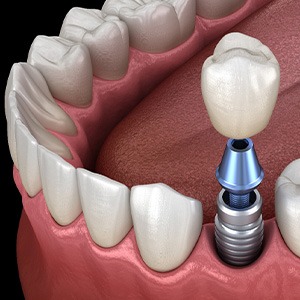
If you have just one lost tooth, ask us about the following options:
- Dental bridge: This restoration can replace one tooth or several teeth in a row. The prosthetic tooth or teeth are anchored in place with two custom dental crowns, which are secured on the opposite sides of the gap.
- Dental implants: This state-of-the-art tooth-replacement solution can replace any number of teeth. Single dental implants are particularly impressive because they replicate both the root and crown, giving you a complete smile while also stimulating your jawbone.
To put it simply, no matter how many teeth you’ve lost, or how long ago you lost them, we’re here to help you have a smile you absolutely love again. So, don’t hesitate to schedule a consultation with us! After we conduct a comprehensive oral exam, we can review your treatment options and help you decide which one is best for you.
Types of Dentures

When it comes to tooth replacement, dentures are actually quite versatile in that they can be customized according to your needs. That’s why we offer three different types to take care of a variety of needs. All types, however, consist of a gum-colored base and prosthetic teeth.
Partial Dentures
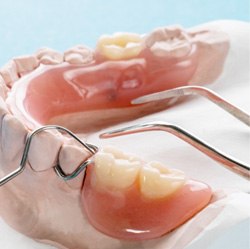
If you still have viable natural teeth left, a partial denture can connect to and use these teeth for stability while filling in the gaps in your smile even if the gaps aren’t close together. Usually, partial dentures have a plastic or metal clasp to hold onto teeth, but regardless, we’ll make sure your smile looks realistic.
Full Dentures
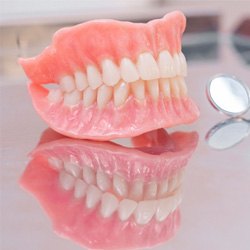
Total tooth loss necessitates complete tooth restoration. Full dentures are fitted in a way that suction holds the restorations in place. But, thanks to modern technology and materials, these dentures will feel more comfortable than what your grandparents had back in the day.
Implant Dentures
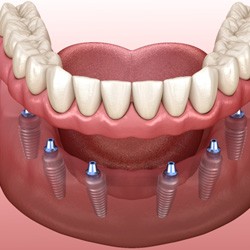
Although traditional dentures have come a long way in recent years, implant dentures take these replacements to the next level of security and longevity. Instead of resting on top of the gums, implant dentures attach to posts that are embedded in the jawbone, giving your fake teeth a realistic look and feel as well as additional stability.
The Benefits of Dentures

There’s a reason why dentures are still one of the most popular options for tooth replacement—they work! Instead of suffering from confidence, eating, and communication issues because of the lack of teeth, you can continue to smile, eat, and talk confidently.
Compared to implants, traditional dentures tend to be more affordable in the short term and require less time. Keep in mind that implant dentures come with a higher upfront cost and entail a longer time commitment from placement to restoration, but they also prevent jawbone resorption or degradation that comes with tooth loss and give you a stronger bite.
Dentures Aftercare

Take good care of your dentures to ensure that they last for as long as possible. Due to gradual changes in your mouth and normal wear and tear, you will need to replace your dentures about every 5 to 7 years. To keep them in good condition, it’s important that you are taking all the proper steps to care for them. Here are some of the ways that you can keep your replacement teeth looking their best.
Remove After Eating

After each of your meals, remove your dentures to rinse them off. This will help to prevent the buildup of food debris, plaque, and harmful bacteria. When you rinse your dentures, be sure that the water isn’t too hot. High temperatures can warm the denture material, causing it to warp and no longer fit properly.
Clean Your Restoration
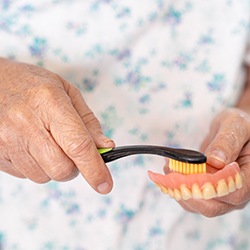
When it becomes time to clean your dentures, use a soft-bristled toothbrush and a small amount of unscented hand soap, mild dish soap, or denture cleanser to gently brush them. If you aren’t going to wear your denture again right away, put them in a container of water or denture cleansing solution so that they don’t dry out and lose their shape. Remember to always rinse your dentures thoroughly before returning them to your mouth.
Keep Your Dentures Safe
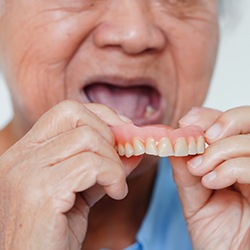
When you clean your dentures, it is ideal to place a towel beneath them in case they slip out of your hands by accident. This reduces the likelihood of them becoming damaged. When you aren’t wearing your dentures, be sure to keep them in a place that is inaccessible to children or pets.
Remove Dentures When You Sleep

You should take your dentures out at night before you go to sleep. Wearing dentures restricts the circulation of your gum tissue, resulting in soft-tissue irritation. Sleeping with dentures has also been associated with higher levels of gum and tongue plaque. Overnight, keep your dentures in a denture-soaking solution. Don’t let them dry out because they can lose their shape.
Notice Changes

It’s important that you stay on the lookout for changes so you can address them with your dentist. This includes mouth sores, gum irritation, and signs of infection. If your dentures become damaged, you shouldn’t attempt to repair them on your own. You could accidentally cause additional damage. Instead, let us know so we can help.
Denture FAQs
Q What Can’t You Eat with Dentures?
If you’ve been struggling with moderate to severe tooth loss, then you’ll be happy to hear that you’ll be able to enjoy a significantly more varied diet with dentures. That said, there are some foods we don’t recommend eating. Sticky foods, like peanut butter, are not recommended because they can pull your restoration out of place. Hard pretzels, raw almonds, and other extremely crunchy foods should also be avoided since they can cause a serious chip or crack.
Ultimately, the best thing to do is eat soft foods, like cottage cheese, plain yogurt, and oatmeal. Not only are they easy to eat, but they benefit your oral and overall health!
Q Can I Use Regular Toothpaste to Clean My Dentures?
No, you should not use regular toothpaste to clean your dentures. You also shouldn’t use a hard-bristled toothbrush or household cleaners, like bleach. Instead, you should use a soft-bristled toothbrush as well as a special denture cleaner or mild dishwashing liquid.
Q Do Dentures Break Easily?
Dentures are crafted from only the best materials, so you don’t have to worry – they aren’t fragile or flimsy. With all of that said, we still recommend taking certain precautions, like cleaning your restoration over a soft towel or a sink filled with water. If an accident happens, like yours gets damaged or misplaced, then call us ASAP so we can repair or replace it.
Q Should I Have All My Teeth Pulled to Get Dentures?
If your remaining teeth are healthy, they shouldn’t be removed. Of course, if they are badly damaged or decayed beyond the point of repair, then we will extract them before having your custom denture made. We can also provide any other restorative dental care that’s needed, like gum disease treatment.
Q Can I Sleep with My Dentures?
We may recommend wearing your dentures for the first 24 hours after you get them. After that, however, you should get in the habit of taking them off at night. Not only will this help keep your restoration in pristine condition, but it will also prevent soft tissue irritation, mouth sores, and pneumonia. To put it simply, soaking your denture in a glass of water or dentist-recommended cleaner will benefit both your oral and overall health.
Q Is It Hard to Talk with Dentures?
Although dentures are custom-made for each patient to ensure they fit comfortably and don’t protrude unnaturally, it’s very normal to experience a bit of a learning curve at first. The good news is that it’s only temporary. Plus, there are several ways to speed up the adjustment period, like reading out loud or conversing with a trusted friend.
Tip: Before you speak, bite down on your dentures and swallow. This will ensure your restoration is in the right position and that excess saliva doesn’t muddle your speech.
Banner Photos by Doug Kerr
